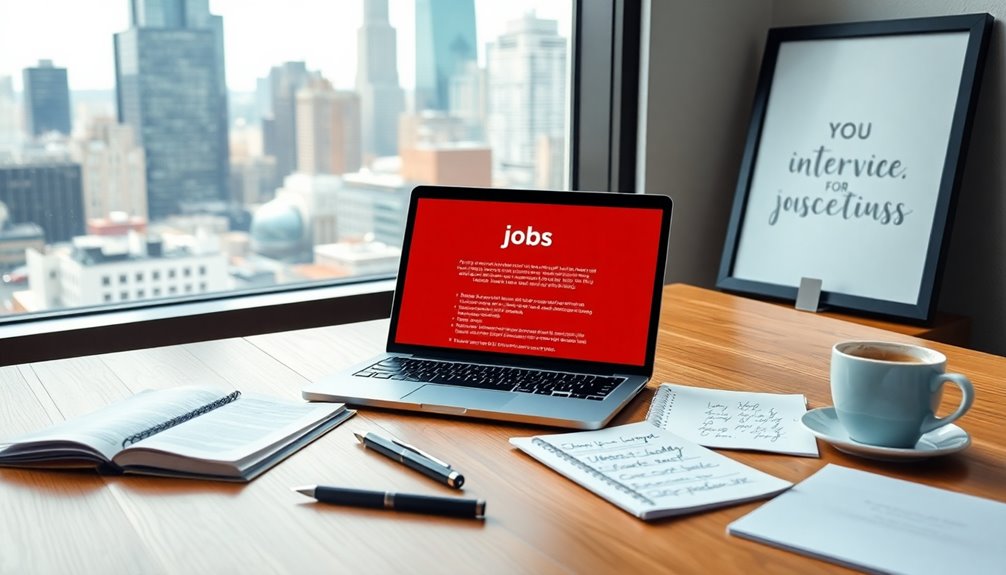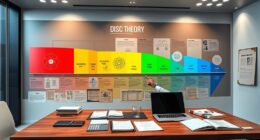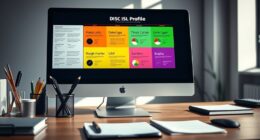To dominate job interviews, you've got to focus on seven key strategies. Start by researching your potential employer and analyzing the job description. This helps you align your skills with the role. Master common interview questions and prepare insightful queries to show your interest. Dress for success to make a positive first impression, and manage your body language to convey confidence. Finally, don't forget to follow up effectively with a personalized thank-you note. Each of these tactics can set you apart from the competition and boost your chances of landing the job you want. There's more to explore on this journey!
Key Takeaways
- Research the employer thoroughly, including their mission, culture, and recent news, to tailor your responses effectively during the interview.
- Align your skills and experiences with the job description, using quantifiable achievements to demonstrate your fit for the role.
- Prepare for behavioral questions using the STAR method, showcasing your problem-solving skills and relevant experiences.
- Dress appropriately and maintain confident body language, demonstrating professionalism and engagement throughout the interview.
- Follow up with a personalized thank-you note, reinforcing your interest and asking insightful questions about the role and company culture.
Research the Potential Employer

Before stepping into a job interview, you should spend a significant amount of time researching the potential employer. Start by diving into the corporate website to grasp the company's mission, products, and services. This foundation will help you understand their core objectives.
Next, check their social media presence on platforms like Facebook and LinkedIn. Look at how they interact with customers and represent their brand; this insight can reveal a lot about their culture. Employee feedback can also reflect changes in company culture, providing a clearer picture of the work environment.
Stay updated on recent news and press releases to catch any developments or announcements that might impact the company.
Explore into the company's history to learn about its founding, evolution, and significant milestones; knowing this can give you conversation points during the interview.
Familiarize yourself with key executives and their roles—this understanding can show your genuine interest in the company's leadership.
Finally, explore the company's DEIB initiatives and workplace environment by reading employee testimonials on sites like Glassdoor. This will help you gauge whether the company culture aligns with your values, ensuring you present yourself as a well-informed, engaged candidate during the interview.
Analyze the Job Description

When you analyze the job description, start by pinpointing the key responsibilities and essential skills required for the role. This helps you align your experience effectively, showcasing how your background fits the employer's needs. Additionally, conducting a thorough job analysis can provide insights into the necessary competencies that will enhance your candidacy.
Key Responsibilities Overview
Analyzing the job description is essential for understanding the key responsibilities associated with a role. Start by outlining the job duties and identifying specific tasks involved. Take note of how often each task is performed and its importance to the overall role. Consider the physical and mental demands, as well as the tools, equipment, and software you'll need.
Next, focus on the desired outcomes and expectations of the position. Define what success looks like and how your role contributes to the organization's goals. Understand the key performance indicators (KPIs) tied to the position, and recognize how your work impacts other departments. Researching the company's values can also aid your preparation. Additionally, consider how your role may involve managing irregular income if the position includes variable compensation structures.
Gathering information effectively can also aid your preparation. Observe current employees or conduct interviews with them and their supervisors to gain insights. Use questionnaires or surveys to collect additional data on job responsibilities.
Finally, integrate this analysis into your interview preparation. Practice articulating your fit for the role and review the company's context. Be ready to discuss how your qualifications align with the responsibilities outlined in the job description, and remember to use the STAR method for behavioral questions.
Essential Skills Required
Essential skills required for a job often dictate how well you'll perform in a given role. To ace your interview, start by thoroughly analyzing the job description. Focus on the required skills, responsibilities, and any keywords that stand out. Make sure you understand what the company seeks in a candidate.
Research the company's mission, values, and recent achievements. Familiarizing yourself with its history and culture will help you align your answers with their goals. Knowing the company's future objectives can also guide how your career aspirations fit into their plans. Additionally, be sure to communicate effectively during the interview to enhance clarity and engagement. Utilizing data-driven marketing strategies can help you articulate how your skills can contribute to the company's success.
Prepare specific examples that showcase your relevant skills and experiences. Use the STAR method to structure your responses, especially for behavioral questions. This will help you clearly articulate your contributions and how they align with the job's needs.
Practice discussing both technical and soft skills that are essential for the role. Be ready to highlight how your background not only meets the requirements but also supports the company's mission.
Aligning Experience Effectively
Your ability to align your experience with the job description can considerably enhance your chances of landing an interview. Start by breaking down the job description. Identify key skills and qualifications, and analyze the listed duties to infer any implied skills. For example, knowing Quickbooks suggests computer literacy. Review the company's values to understand the culture and soft skills they prioritize.
Next, match your skills with evidence. Create a table where you list the job requirements alongside your personal experiences, drawing from education, volunteer work, or personal projects. Quantify your achievements to show measurable impact and emphasize transferable skills that can apply across various roles.
Tailor your resume and application to reflect the exact phrasing used in the job description. This alignment not only helps with Applicant Tracking Systems but also demonstrates your understanding of the field. Prioritize skills that align with the company's goals, focusing on how you can contribute to productivity or cost-saving. Conducting a personal skills audit before you begin tailoring your resume can also help you identify which skills to emphasize.
Finally, guarantee your application is polished and relevant. Use bullet points for key skills and check for any spelling or grammar errors. A concise, focused resume can make all the difference in securing that interview.
Master Interview Questions

When preparing for an interview, mastering common questions can greatly boost your confidence and performance. Start with autobiographical questions like "Tell me about yourself" and "What motivated you to pursue your current career?" These help you present your background in a relatable manner.
Next, tackle employment and career questions such as "Why are you leaving your current job?" and "Can you explain your employment gap?" Be honest but strategic in your responses.
For behavioral questions, use the STAR method: describe the Situation, outline your Task, detail the Actions you took, and share the Result. This structure helps you convey your problem-solving skills effectively. Utilizing this method can enhance your ability to craft effective responses.
Also, prepare for future-oriented questions like "Where do you see yourself in 5 years?" to showcase your ambition and alignment with the company's goals. When asked about your interest in the company or role, reference your research on their mission and values, highlighting how you fit in.
Finally, when discussing strengths and weaknesses, connect them to the job description. Be honest about areas for improvement but emphasize your commitment to growth. This approach shows your readiness to contribute to the organization.
Prepare Insightful Questions

Preparing insightful questions not only demonstrates your interest in the role but also helps you gather essential information about the company and its culture. Start by researching the company's history, recent announcements, and executive officers. Familiarize yourself with its values, culture, and mission. Use resources like Indeed Company Pages to read reviews and explore open jobs.
When it comes to the role, immerse yourself in the job description to clarify required skills and responsibilities. Ask about a typical day and what key achievements are expected within your first 90 days. Understanding how success is measured will also give you valuable insights. Critical thinking is often essential in decision-making, so consider asking how the company approaches problem-solving. Remember, employers also conduct background checks to verify candidate information, so be prepared for questions regarding your history.
Don't overlook the team dynamics! Inquire about team size, roles, and how your position interacts with other departments. Discover the company culture and how it recognizes success, especially regarding diversity, equity, and inclusion.
Finally, focus on growth. Ask about professional development opportunities and career advancement pathways. Understanding the company's future vision and its approach to work-life balance will help you gauge if it aligns with your own career goals.
These thoughtful questions will set you apart and show you're serious about the opportunity.
Dress for Success

For a business formal setting, opt for a well-fitted single-breasted suit in conservative colors like black, navy blue, or grey. Women should consider tailored skirts or pants paired with a matching jacket, guaranteeing skirts are knee-length or longer. Establishing consistent routines can also help reduce anxiety before the interview.
If the dress code is business casual, stick to black or navy dress pants with a button-down shirt or blouse, topped with a cardigan or jacket. In more relaxed environments, dark jeans or fashionable skirts without holes can work.
Regardless of the style, avoid bold patterns; minimalistic designs project professionalism. This is especially important because 37% of managers decide against candidates based on attire.
Pay attention to your footwear, too. Choose clean, polished conservative dress shoes—avoid loafers or tennis shoes. Make sure your socks are dark and unobtrusive, and for women, stockings should be flawless.
Finally, remember that fit and comfort matter. Your outfit should allow you to move freely and feel confident. Researching the company's dress code can help you tailor your attire, so always aim to dress slightly more formally than required.
Manage Body Language

Effective body language can greatly influence the outcome of your job interview. It's not just what you say, but how you present yourself that matters. By managing your body language, you can convey confidence and engagement, making a lasting impression on your interviewer.
Here are three key aspects to focus on:
- Eye Contact and Facial Expressions: Maintain eye contact for 2-4 seconds to show confidence. Smile appropriately to convey warmth, and avoid negative expressions like frowning.
- Posture and Seating: Sit up straight with your shoulders back and chin parallel to the floor. Avoid slouching or crossing your arms, as it can signal defensiveness. Lean slightly forward to show interest.
- Hand Gestures and Movements: Use hand gestures purposefully to emphasize your points. Keep your hands relaxed and avoid fidgeting. Palm-up gestures can signify honesty and trustworthiness.
Follow Up Effectively

After your interview, crafting a thoughtful thank-you note can set you apart from other candidates. It's also a great opportunity to inquire about the next steps in the hiring process, showing your continued interest. Additionally, sending a follow-up email within 24 hours can reinforce your enthusiasm for the role and keep you top of mind for hiring managers.
Crafting a Thank-You Note
Crafting a thank-you note is an essential step in the interview process that can leave a lasting impression. Sending this note promptly—ideally within 24 hours—shows your enthusiasm and professionalism. Sending this note also aids in employer recall during decision-making processes, which can significantly influence your chances of being selected.
If your interview lands on a Friday, aim to send it that day or by Monday/Tuesday.
Here are three key elements to include in your thank-you note:
- Personalization: Reference specific details from your conversation, shared interests, or the interviewer's passion for their role. This shows you were engaged and attentive.
- Conciseness: Keep your note brief, ideally one to two paragraphs. Stick to 250 words or less, ensuring clarity and organization throughout.
- Professionalism: Start by thanking the interviewer for their time and reiterate your interest in the position. Mention relevant skills or experiences that demonstrate your fit for the role.
Close with a formal sign-off and your full name, along with your contact information.
Next Steps Inquiry
Following up after your interview is an essential step in the job search process. It shows your enthusiasm and professionalism. Wait at least 10 days if the hiring manager mentioned they'd be in touch 'next week.' This gives them time to process applications and interview other candidates. A follow-up call is a great way to determine if a hiring decision has been made.
Refrain from contacting them on the day of or right after the interview; patience is key.
When you follow up, start with a clear introduction, including your name and the job title you interviewed for. Mention something specific from your interview to jog their memory.
Make sure to express your continued interest in the role and the company, and politely inquire about the timeline for their hiring decision.
Maintain a professional tone throughout your message. Avoid humor or unnecessary small talk; be direct about seeking an update on the recruitment process.
Use a template if it helps. For emails, include a clear subject line and a courteous closing. For phone calls, introduce yourself and reference your interview details.
Frequently Asked Questions
How Do I Handle Difficult Interview Questions?
When you face difficult interview questions, take a deep breath and pause before responding. This gives you a moment to collect your thoughts.
Use the STAR method to structure your answers, focusing on specific situations, tasks, actions, and results. If a question seems vague, don't hesitate to ask for clarification.
Remember to maintain eye contact and stay calm, as your composure can greatly impact the interviewer's perception of you.
What Should I Do if I'm Late to an Interview?
Being late to an interview feels intimidating, but you can handle it. First, notify the recruiter immediately with a sincere apology and a brief explanation. Keep it professional and don't dwell on details.
If the delay's significant, offer to reschedule or switch to a video call. Upon arrival, express gratitude for their understanding and maintain your professionalism.
How Can I Showcase My Personality During the Interview?
To showcase your personality during the interview, start by researching the company's culture and values.
Use storytelling to connect your experiences to the role, employing the STAR method for structure.
Dress appropriately but add a personal touch, and maintain confident body language.
Engage in genuine conversation, allowing your authentic self to shine through.
Finally, ask insightful questions that demonstrate your enthusiasm and curiosity about the company and how you can contribute.
What if I Don't Have Experience in the Specific Field?
Think of your lack of experience as an uncharted territory. Embrace it!
You can showcase your adaptability and willingness to learn. Highlight transferable skills from past roles or activities, demonstrating how they've shaped you.
Share examples that reflect your problem-solving abilities and passion for growth. Employers appreciate fresh perspectives, so focus on your potential and excitement.
Should I Bring a Copy of My Resume to the Interview?
Yes, you should definitely bring a copy of your resume to the interview. It shows professionalism and preparedness, and interviewers usually expect it.
Having multiple copies—about 5 to 7—ensures everyone gets one, especially if there are several interviewers. This way, you can easily reference your experiences and qualifications during the discussion.
Plus, it helps you address any changes made since your initial application. Keep them organized in a professional folder for easy access.
Conclusion
Now that you’ve got the insider secrets to ace your job interview, you’re ready to shine like a diamond in a sea of cubic zirconia. Remember, preparation is key—research, practice, and present yourself confidently. With these tips, you’ll transform the intimidating interview process into an engaging conversation. Don’t forget to follow up; it shows you’re genuinely interested. So, suit up, channel your inner rock star, and get ready to land that dream job! Looking for insider tips for project manager interviews? Look no further! As a project manager, it’s crucial to demonstrate your organizational skills, leadership abilities, and problem-solving prowess. Be prepared to discuss specific examples of successful project outcomes and how you effectively managed your team. By showcasing your expertise and utilizing these insider tips, you’ll undoubtedly impress your potential employers and secure that coveted project manager position.
Emmeline is the backbone of our content creation team, bringing complex psychological concepts to life with clarity and empathy. As our Expert Writer, she crafts engaging, insightful articles that guide readers through the intricacies of personality assessments and what they reveal about the human condition. Her passion for psychology and personal development shines through in every piece she writes.










